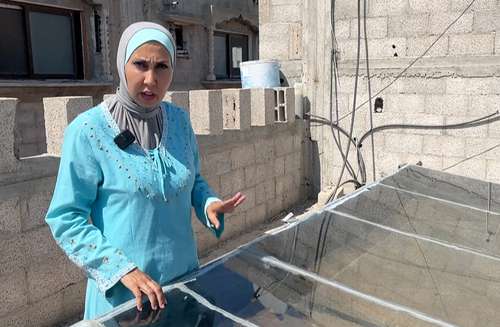Palestinian engineer creates homemade system to supply drinking water to her village
Khan Yunis. Amid the destruction of the Gaza Strip, a Palestinian engineer created a homemade desalination system out of wood and glass to provide drinking water to her neighbors affected by the shortage of this vital resource.
The device designed by Ines al-Gul consists of a vessel made from wood delivered by the few humanitarian aid platforms that enter the territory and glass recovered from the ruins of bombed buildings.
Beneath the glass, salt water from the sea or the water table evaporates and condenses into distilled droplets, which, through a long black tube, reach other conduits filled with activated carbon for better filtration.
It is a very simple mechanism, easy to use and build.
says this 50-year-old agricultural engineer, who lives in the city of Khan Yunis, in southern Gaza.
Getting clean water was already difficult before the war with Israel, triggered by Hamas’ deadly attack on October 7. The situation has been made worse by the conflict, which, according to estimates by the non-governmental organisation Oxfam, has caused the amount of water available in Palestinian territory to plummet by 94 percent.
The resource available per Gazan is now 4.74 liters per day, less than one third of the minimum recommended in emergency situations
the organization assures.
Without supplies for months and with the enclave’s only power station paralyzed, the Al-Gul system has the advantage of “not needing electricity or solar panels.
We just need sun
says the engineer. This is one of the few commodities that is not in short supply in Gaza, with an average of 14 hours of sunshine a day in summer and eight in winter.
For Mohamed Abu Daud, a displaced Gazan with a sweaty forehead due to the stifling summer heat, this invention “comes at the ideal time.
We have been drinking clean water for two months thanks to this system
says Afp.
Water shortages were a common problem in the coastal territory, where, according to the UN, poor sanitation infrastructure has led to much of the groundwater being contaminated by wastewater that is not properly treated.
In addition, the water reserve in this area on the edge of the desert is overexploited. The level is falling and seawater is infiltrating, increasing salinity.
Weapon of war
At the school converted into a shelter for displaced people where Ines al-Gul set up her contraption, several families wait to refill their small plastic bottles.
The bin has a capacity of 250 litres, but is quickly emptied due to the enormous needs of the population.
Oxfam, which accuses Israel of using Water as a weapon of war
denounces a deadly health catastrophe
for the 2.4 million Gazans, almost all of whom have been displaced at least once by war.
The organization states that Israeli strikes damaged or destroyed its five water supply and sanitation facilities
.
Consequently, 26 percent of the population is seriously affected by easily preventable diseases
.
Ines al-Gul watches her device like the apple of her eye, but with the incessant bombings, nothing is ever safe
the population of Gaza repeatedly warns.
This does not prevent the engineer from regularly going up to her terrace, exposed to the sun and drones, to open and close her precious taps.
